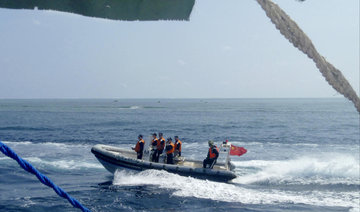UNDISCLOSED, Ukraine: Oleksandr deserted from the front line in eastern Ukraine after watching his fellow servicemen being pulverized by Russian bombardments for six months. Then, those remaining were ordered to counterattack.
It was the final straw for Oleksandr, 45, who had been holding the line in the embattled Lugansk region in the early months of the war. Even his commanding officer was reluctant to send his men back toward what looked like certain death.
So when Oleksandr saw an opening to save his life, he did.
“We wanted to live. We had no combat experience. We were just ordinary working people from villages,” the soft-spoken serviceman, who declined to give his last name, said.
His decision is just one of many cases plaguing the Ukrainian military, which has already suffered at least 43,000 losses in nearly three years of fighting, President Volodymyr Zelensky revealed this month.
The government is also struggling to recruit new troops.
Together, these manpower problems present a critical hurdle for Ukraine, which is losing territory to Russia at the fastest rate since the early days of the February 2022 invasion.
The issue was put under the spotlight in September when 24-year-old serviceman Sergiy Gnezdilov announced in a scathing social media post that he was leaving his unit in protest over indefinite service.
“From today, I am going AWOL with five years of impeccable soldiering behind me, until clear terms of service are established or until my 25th birthday,” he wrote.
The state investigation service described his statement as “immoral” and said it played into Russia’s hands. He was detained and faces up to 12 years in prison.
Figures published by the Ukrainian general prosecutor’s office show that more than 90,000 cases have been opened into instances of soldiers going absent without leave or deserting since Russia invaded in 2022, with a sharp increase over the past year.
Oleksandr said that after leaving the frontline, he remembered little from the year he spent at home in the Lviv region owing to concussions he suffered while deployed.
He recounted “mostly drinking” to process the horrors he witnessed but his guilt was mounting at the same time.
He ultimately decided to return after seeing young Ukrainians enlist or wounded troops return to battle — despite pleas from his family.
His brother was beaten during the historic Maidan protests in 2013 that toppled Ukraine’s pro-Kremlin leader, and later died.
His sister was desperate. “They’re going to kill you. I would rather bring you food to prison than flowers to your grave,” he recounted his sister telling him during a visit from Poland.
It was guilt, too, that motivated Buch, who identified himself by a military nickname, to return to battle.
The 29-year-old deserted after being wounded in fierce fighting in southern Ukraine in late 2022 during the liberation of Kherson city.
“Just staying under constant shelling gradually damages your mental state. You go crazy step by step. You are all the time under stress, huge stress,” he said of his initial decision to abscond.
In an effort to address manpower shortages, Ukrainian lawmakers in August approved an amnesty for first-time offenders who voluntarily returned to their units.
Both the 47th and 53rd brigades in December announced they would welcome back servicemen who had left the front without permission, saying: “We all make mistakes.”
Prosecutors said in early December that 8,000 servicemen that went absent without leave or deserted had returned in November alone.
Still, Siver, commander of the 1st Separate Assault Battalion, known as Da Vinci, who also identified himself by his military nickname, said the number of Ukrainian troops fleeing the fighting without permission was growing.
That is partly because many of the most motivated fighters have already been killed or wounded.
“Not many people are made for war,” said Siver, describing how his perceptions of bravery had been reshaped by seeing those who stood their ground, and those who fled.
“There are more and more people who are forced to go,” he said, referring to a large-scale and divisive army mobilization campaign.
But other servicemen interviewed by AFP suggested that systemic changes in military culture — and leadership — could help deter desertions.
Buch said his military and medical training as well as the attitudes of his superiors had improved compared to his first deployment, when some officers “didn’t treat us like people.”
Siver suggested that better psychological support could help troops prepare for the hardships and stress of battle.
“Some people think it’s going to be like in a movie. Everything will be great, I’ll shoot, I’ll run,” he said.
“But it’s different. You sit in a trench for weeks. Some of them are knee-deep in mud, cold and hungry.”
He said there was no easy solution to discouraging desertion, and predicted the trend would worsen.
“How do you reduce the numbers? I don’t even know how. We just have to end the war,” he said.
Desertions spark panic, and pardons, in Ukraine’s army
https://arab.news/r683q
Desertions spark panic, and pardons, in Ukraine’s army

- Manpower problems present a critical hurdle for Ukraine, which is losing territory to Russia at the fastest rate since the early days of the February 2022 invasion

























